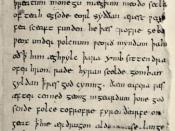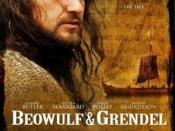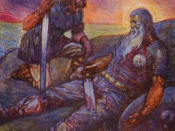To be without silver is better than to be without honor. -- Old Norse Proverb
R.M. Liuzza's reflections on his translation of Beowulf treated this early work as historical text, a poem and a myth. The ambiguities surrounding Beowulf's origins, however, made an isolated historical analysis limited. As Liuzza acknowledged, Beowulf is, "a fictionalized matrix of past in present in the text"(17) and was survived in small collection of other texts, copied by two different scribes, its original purpose and audience unknown (11). Since the poem likely originated from oral traditions, a literary analysis also falls short. Beowulf "is frustratingly ambivalent"(11). But, reading it as a mythic work, however, is a strong lens for understanding the Scandinavian imagination.
Myth, as R.M. Liuzza observed, works to, "condense and contain the most fundamental sources of cultural tension," in a society, and also, "validate[s] current ideologies"(18). Beowulf transmitted Scandinavian ideologies about the structure of society.
Order stemmed from the virtues of loyalty, kinship and courage and Beowulf, the character, becomes the physical embodiment of order. The work also contained antagonists, such as the fratricidal Unferth, the monstrous Grendel and Grendel's mother, that pose a threat to this order. Conflicts between Beowulf and the antagonists therefore represent the fabric of Scandinavian society, giving rise to the cultural anxieties Liuzza described.
Characters in Beowulf are, "drawn in grotesque caricature"(19), exaggerating features of the character's persona. The hero was not meant to be read simply as Beowulf's protagonist, therefore, but to represent and defend Scandinavian culture. Beowulf represents qualities that were valued in Scandinavian culture; he is courageous, loyal and honors kinship. As the author of Beowulf states, "the son of Ecgtheow showed himself brave, renowned for battles and noble deeds, pursued honor, by no means slew, drunken, his hearth-companions; he had no savage heart"(119). Beowulf...


